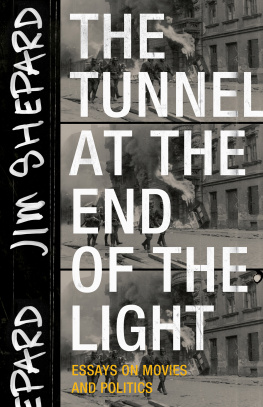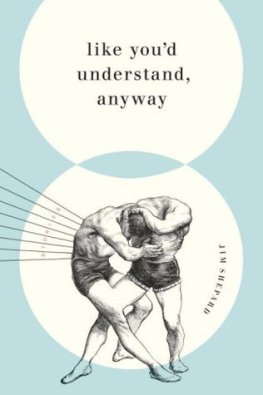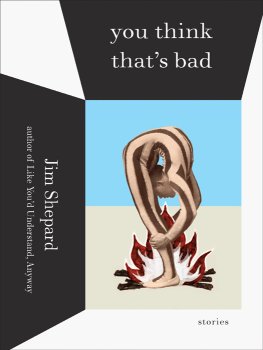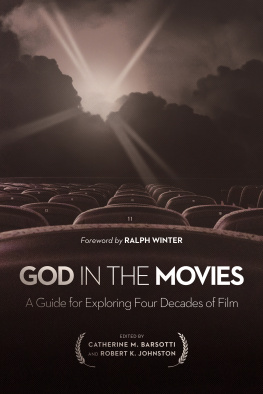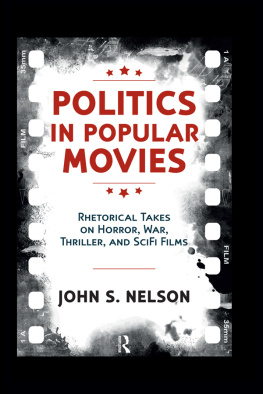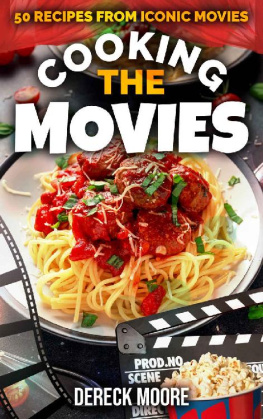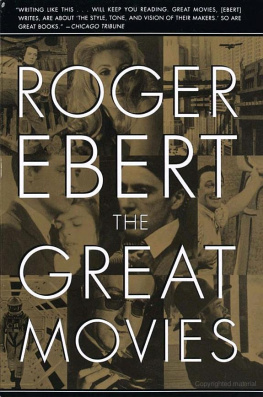
For John, who knows more about movies
than anyone Ive ever met.

BARRY GOLDSTEIN
JIM SHEPARD is the author of seven novels, including The Book of Aron; five story collections, including Like Youd Understand, Anywaya finalist for the National Book Award and winner of the Story Prizeand editor of the anthology Writers at the Movies. He lives in Williamstown, Massachusetts, with his wife, three children, and three beagles. He teaches at Williams College.
If it was anybody else, Id say what was going to happen to you would be a lesson to you. Only youre going to need more than one lesson. And youre going to get more than one lesson.
Boss Jim Gettys to Charles Foster Kane, Citizen Kane
H ow resourcefully pessimistic would you need to have been to have predicted in 2007 that as early as 2017, George W. Bushs administration would appear benign by comparison with an administration headed by Donald Trump? Nearly everything about that Bush administration represented for American politics and the American people what Charles Foster Kane might have called a new lowhave you got that, Jedediah? A new lowand all of it portended a disastrous direction that the American ship of state was headed. But who could have imagined that our democracy would be tipping off the edge of Victoria Falls this quickly?
In 2003 Dave Eggers wrote me to say he was starting a monthly magazine, The Believer, which would feature long book reviews, articles, and interviews, as well as a lot of political writing, especially concerning anti-war efforts. He wanted to know if I would consider contributing to it regularly, writing about movies. Hed heard about my film teaching from some of my former students who were now working with him, and hed heard about the way I incorporated movies into my talks about literature. When I got back in touch with him I told him I wasnt interested in being a movie reviewer, and he made it clear that that wasnt what hed had in mind, and eventually we settled on the idea of essays about the ways in which mostly American movies from various periods illuminated current political concerns. I started with Badlands, a movie that had always seemed to me to get at something essential about how truly and lethally weird Americans really are, and from there I was off and running. Did anything capture the high-spirited glee of American ruthlessness better than GoodFellas? Was there anywhere a more accurate portrait of the lunatic serenity of our leaders convictionin the face of all evidence and their own lack of knowledgethan could be found in Lawrence of Arabia? For about four years, I had a lot of fun writing those essays and got a lot of gratifying feedback on them, my favorite probably being a postcard the editors forwarded to me from Kurt Vonnegut on which he had written only God bless Jim Shepard! Then a few years ago, while we stood around at the Tin House Workshop sloshing drinks on one another, editor Tony Perez broached the idea of assembling all the essays into one collection. They certainly still seemed timely, given that, even after two terms of a Democratic administration, nearly all of the critiques still felt painfully relevant. Sure, I told him: if you guys are okay with doing all of this work and not making any money, so am I.
As anyone doing cultural criticism these days might have predicted, these essays are mostly about the power and resilience of the lies we tell ourselves as a collective. Movie genres emerged as a kind of implicit ongoing conversation between audiences voting with their feet and moviemakers doing what they could to standardize expectations and build on past successes. As those conversations became more refined, film genres began to appeal less to our experience of reality and more to the rules of the genres themselves; in other words, they created their own fields of reference.
And is it possible to imagine an administration that would foreground that issue more spectacularly and urgently than our current one? We now confront a regime that presents as its public face hacks and sociopaths who have no trace of shame about lying directly in the face of contradictory evidence. Of course, in many ways the veteran political scientists response to that would be: So whats new about that? Americans have been covertly demanding this for years, but recently a large percentage of us have come very close to just telling our leaders and media: dont tell me the truth anymore, and if you do, Im going to get enraged. And now thats earned us a government that has openly declared war on the free transfer of information and has set about punishing any allegiance to what it considers unpleasant truths. This is what empires do at the end: they refuse to face the facts that the world is changing and they no longer have unlimited hegemonic power. And of course citizens are encouraged to refuse to face those facts by their leaders, who find denying the truth infinitely easier than answering questions about why they cant change it.
The models on display in these moviesthe sentimental sociopath, suffused with self-pity; the feckless cipher bereft of any inner life who defines himself, then, by aggressive action; the isolated narcissist who imagines himself as a Hero in Disguise and takes as a matter of course his primacy over others; the movers and shakers who are now open and ebullient in their rapacity and ruthlessness; the megalomaniacs whose monstrous assurance steamrolls any doubt generated by the world of contradictory facts; the willed innocents who wreak havoc obliviously, with an outraged sense of their own virtue; and the ideologues whove been proven wrong time and time again but have reassured their supporters precisely by their inability to learn, by their insistence that theyre no wafflersat this point theyre all mostly governing us, in both senses of the word.
Looking at these movies and what theyre selling us is a little bit of help, in other words, when it comes to figuring out how we got here. And where are we now, and where are we headed? In one sense, theres never been greater uncertainty as to what lies ahead or what we can predict. Eight years of this president seems as likely or unlikely as his impeachment in year one. Are we really going to attack Iran? Start a war with China over some islands in the South China Sea? Register all Muslims? Outlaw protest? Bomb back to the Stone Age any spot in the Middle East where three guys from ISIS pop up in a truck? But in another sense, its all too clear whats coming. The Republican elite has already abandoned what tiny vestigial traces of integrity it might have had remainingthink of John McCain, who likes to tell himself over and over again that the one thing he wont countenance is torture, having buttoned up his lip and gone along for the ride with Mike Pompeo as head of the CIA; or Lindsey Graham, that old Cold Warrior, now sitting on his hands when faced with the real possibility that the leader of his party is Vladimir Putins puppetwhich now means that all three branches of the government will be acting with full vigor to undermine, if not destroy, American democracy, American constitutional rights, and the physical American landscape. The Republicans have also long understood their own minority position, so, given that agenda, we can expect much more rigorous attempts at gerrymandering and voter suppression. With political change then foreclosed, that leaves the shutting down of information. Were already facing an unprecedented assault on investigative journalism, and this new administrations choice to head the FCC has already announced his determination to do what he can to stamp out the freedoms of the internet. Just four days after the new administration took power it instructed federal employees to cease communicating with the public through news releases, official social media accounts, and correspondence. Somebodys been studying up on their authoritarian regimes: if step one is to refuse the press access in all but the most tightly controlled ways, step two is to shut down the leaks.
Next page
